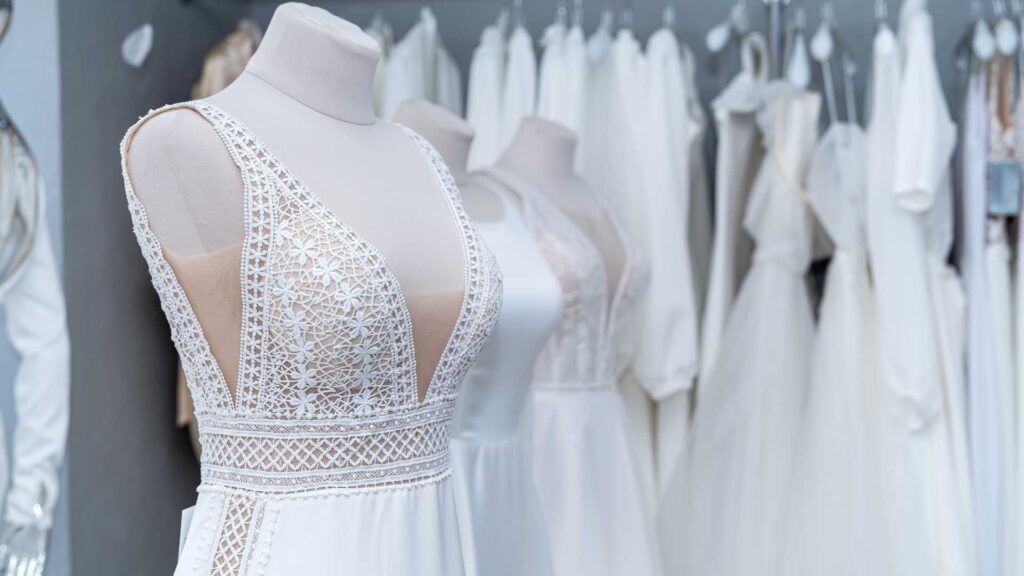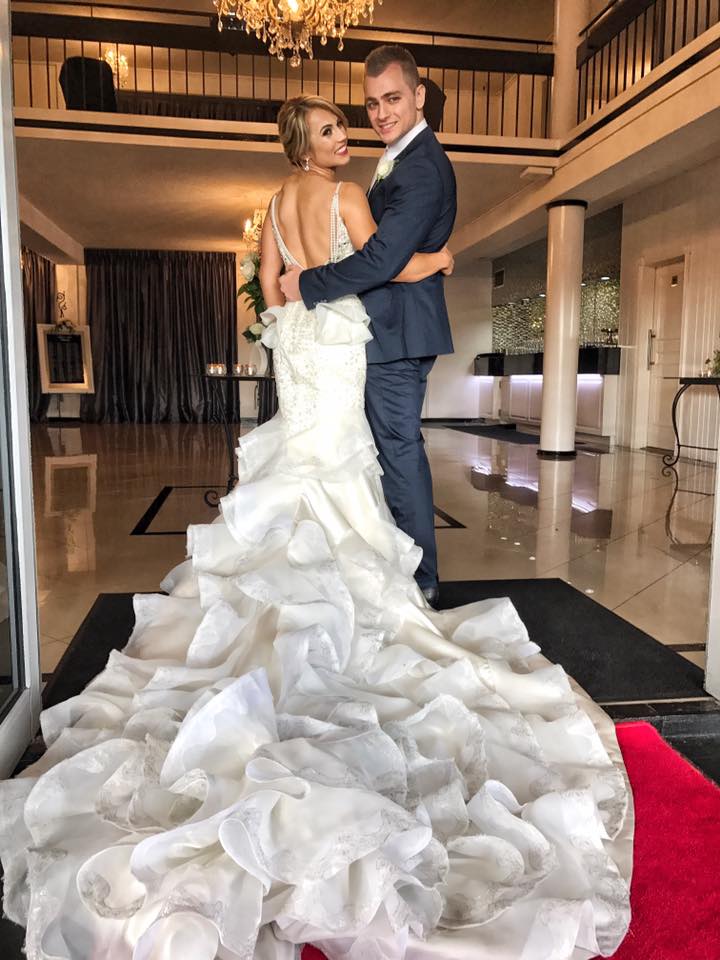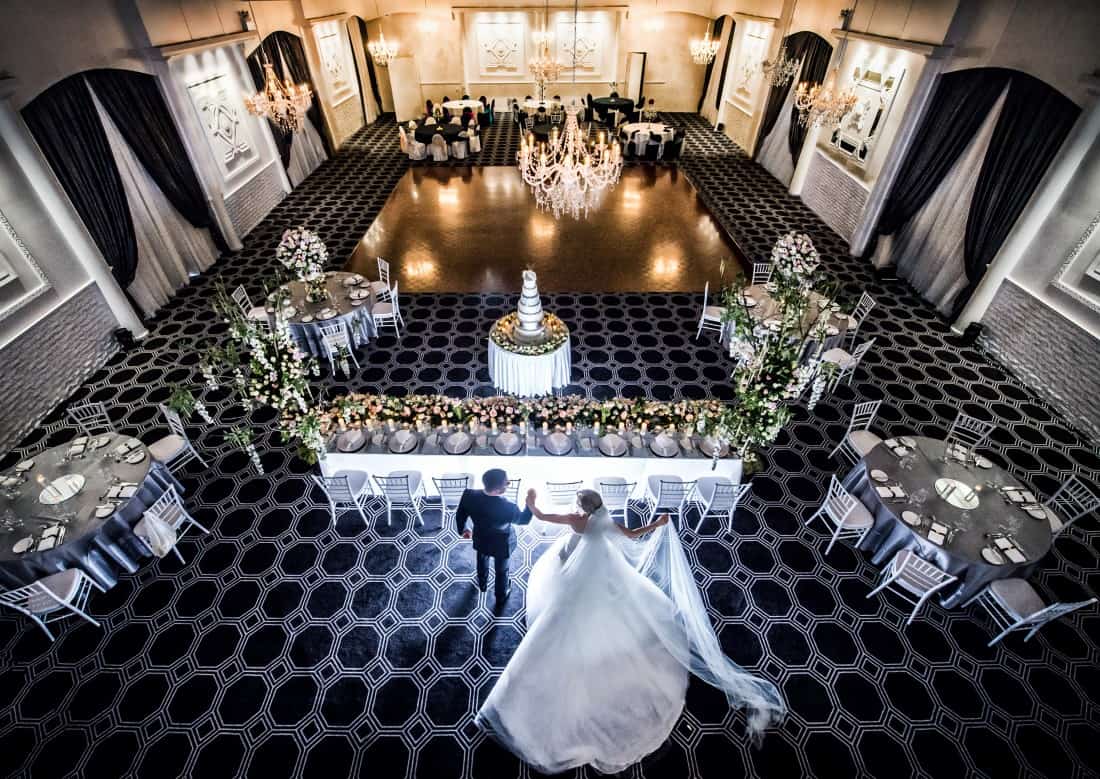Your wedding day is one of the most significant events of your life, and your wedding dress plays a central role in that special occasion. It’s important to take the necessary steps to care for your dress to ensure that it stays in top condition, both before and after the big day.
Whether you decide to clean the gown yourself or rely on professional services, this guide will help you understand the best approach to keeping your dress as beautiful as the day you first wore it.
Let’s Get Straight to the Point
Cleaning your wedding dress properly is essential to keeping it in top condition. Some fabrics, like polyester and charmeuse, can be washed at home, while delicate fabrics like silk, lace, and heavily beaded gowns should be professionally dry-cleaned.
Stains such as oil, dirt, and makeup require specific removal techniques, and hand-washing or using a delicate machine cycle is best for less fragile fabrics. Always air dry your dress and avoid dryers. Store the dress in a cotton bag in a cool, dry place for long-term preservation.
Understanding Your Dress Fabric
Wedding dresses are made from various delicate fabrics, requiring special care. Knowing how to treat your dress based on its material is important. Let’s take a look at the most common fabrics:
Charmeuse
- A soft, silk-like fabric that can be hand-washed or machine-washed on a delicate cycle with cold water.
Lace
- Lace is extremely fragile and should always be hand-washed in cold water to avoid shrinkage and potential damage.
Organza
- Made of silk but more delicate, organza dresses should also be hand-washed to avoid damage.
Chiffon
- Chiffon dresses are best dry-cleaned. If hand washing, avoid placing them near sharp machine blades.
Polyester
- Polyester is often blended with other fabrics and can be washed by hand or in the washing machine on a delicate cycle.
Rayon
- Like polyester, rayon is durable and can typically be hand or machine-washed. Be sure to check the care label for specific instructions.
Jersey
- Popular for modern brides, jersey fabrics can shrink, so hand washing is often recommended unless otherwise specified on the care label.
Taffeta
- Taffeta is often used for both formal and semi-formal dresses. Hand-washing in lukewarm water is generally safe unless the label suggests otherwise.
Tulle
- Tulle ballgowns are often too large for standard washing machines, but they can be machine-washed on a gentle cycle if necessary. However, hand washing is a safer bet.
Steps To Remove Common Stains
Unfortunately, your dress may pick up stains throughout the day. Here’s how to tackle some common types:
Oil-Based Stains (Food Or Makeup)
- Dish soap and white vinegar work well. Apply the mixture to the stain with a cloth or cotton swab.
Grass Stains
- Grass stains, especially along the hem, are tricky. Apply a mixture of water and laundry detergent, leave it for 20 minutes, then rinse thoroughly.
Wine Or Juice Stains
- Act quickly by soaking the stained area in water. If that doesn’t work, add some dish soap. As a last resort, you may try a mild bleach solution.
Dirt Or Clay Stains
- First, use a dry towel to remove dirt, then dab the stain with a damp cloth. Be gentle to avoid embedding the dirt further into the fabric.
Protein-Based Stains (Blood Or Sweat)
- Blot with water, ammonia, peroxide, and dish soap. Be careful not to rub the fabric, which could damage it further.
Lipstick Stains
- These are particularly hard to remove, so it’s best to prevent them altogether. If you must apply lipstick, do so after you’ve put on your gown. If a lipstick stain does occur, you can try makeup remover, but there’s no guarantee it will come out entirely.
Foundation Or Powder Stains
- These can usually be removed with water or a small makeup remover.
Caring For Embellishments And Intricate Details
Wedding dresses often feature delicate embellishments like beads, appliqués, and sashes. If possible, remove these elements before you attempt any cleaning. This will protect them from damage and ensure they don’t get lost. Don’t use a hand or a machine; be careful with beaded bodice gowns. The beading may break if the gown isn’t handled.
Proper Drying Your Wedding Dress
Drying your dress is just as important as washing it. Here are a few important tips:
- Never twist or wring out the dress to remove water. Instead, lay it flat and let it air dry naturally.
- Avoid drying your dress in direct sunlight or extreme temperatures, which can cause discolouration.
- If machine-washing, remove the dress and turn it inside out before hanging it up to dry. Do not use a dryer, as this can permanently damage the fabric.
Once dry, your gown may be wrinkled. It’s best to use a garment steamer to carefully remove wrinkles or take it to a professional cleaner for steaming.
Storing Your Wedding Dress After Cleaning
Once your dress has been cleaned, it’s important to store it correctly. Here’s how:
- Use a cotton garment bag instead of plastic to allow the fabric to breathe.
- Store the dress in a cool, dry place, away from direct sunlight or humidity.
- Lay the dress flat or hang it using padded hangers to avoid creases or fabric distortion.
Following these steps will help ensure your item stays pristine, whether you plan to pass it down or keep it as a cherished memory.
Can You Wash Your Wedding Dress In A Washing Machine?
One common question brides ask is whether they can safely clean their wedding dress at home, particularly in a washing machine. The answer depends on the fabric of the dress. While many wedding dresses can be machine-washed, silk or heavily embroidered gowns are exceptions and should always be handled by professionals.
For those willing to clean their dress, washing machines can be effective, but be prepared for wrinkles. Luckily, these can be removed with a steam iron or pressing. However, some fabrics and detailing may require more delicate care.
Hand Washing Vs. Machine Washing
While hand washing is often the safest option for delicate fabrics, it’s not alwait’secessary. Check the care label on your dress for specific instructions. Some dresses can handle machine washing, but others, especially those made from velvet or linen, are more delicate and should not be exposed to the agitation of a machine.
If you choose to machine-wash, use the most delicate settings and ensure your dress is turned inside out. This will help prevent embellishments from being damaged or lost during the wash.
Fabrics That Should Be Professionally Cleaned
Some dresses cannot be washed at home, especially those made of:
- Silk
- Velvet
- Rayon
- Heavily beaded or embroidered fabrics
These materials require dry cleaning, which uses gentle solvents to remove stains without damaging the fabric. Dry cleaning not only cleans but also preserves the dress, ensuring it remains in perfect condition for years.
Why Dry Cleaning Is The Best Option?
Dry cleaning is often the safest and most effective method for cleaning your wedding dress. The process uses solvents to remove dirt and stains without the friction or heat of washing machines, which can damage delicate fabrics.
One of the benefits of dry cleaning is that it helps to strengthen and preserve the fabric, making it look fresh and vibrant. It also ensures that any stains, even those that may have set in after the wedding, are fully removed.
Dry Cleaning Services For Wedding Dresses
If you need more clarification about cleaning your dress, it’s always wise to consult a professional dry cleaner who specialises in wedding dresses. They can assess the fabric, stains, and damage to determine the best action.
Many same-day dry cleaners also offer repair services, such as reattaching beads, fixing rips, and restoring your dress to its original condition. This is particularly useful if you preserve the dress as a keepsake.
Your wedding dress is a significant piece of your big day, and caring for it properly ensures that it will remain beautiful for years. Whether you choose to clean it yourself or enlist the help of professional dry cleaners, understanding the fabrics and techniques needed for its care will keep your gown looking as perfect as the day you wore it.
From machine washing certain fabrics to carefully removing stains and preserving delicate embellishments, taking the time to care for your wedding dress properly will protect it as a cherished memento of your special day.




